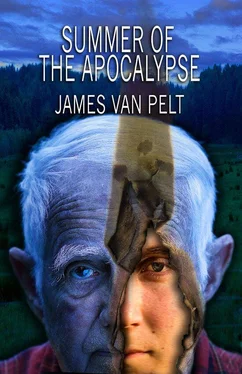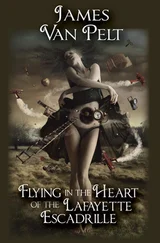Cloth rustled against cloth. “Yes.”
“Did Dad carry all this stuff up here by himself?”
She moved again. A blanket scraped across the plastic ground cloth. “When he heard how bad the disease might be, he started buying things and bringing them up on the weekends or after work.”
“No, really?”
“It tired him, Eric. He couldn’t tell anyone.”
“Did you help?”
“This is the first time I’ve been here.” She sighed. “He said he would be fine.”
“How did he get the mattresses? I mean, I could see a box of beans or something, but the mattresses? Arnold Shwarzenegger couldn’t get up that trail with a load like that!”
“He’s persistent when he’s got a goal,” she said.
Eric stood eight inches taller than Dad, which made Dad as small as the smallest kids in his class. “He’s not strong enough!” Eric caught his breath. Dad moved on his mattress, rolling on his back. Eric’s bed, which was pushed against Dad’s, shifted slightly.
Dad cleared his throat, then said, “A man needs a hobby. Now get some sleep.” But Eric couldn’t. Not with the total blackness settled over him, not with the rustle of leaves in the entrance crawlway or the skitter of rodent paws over rock. He smelled mice droppings. Eventually, Eric reached under the blankets for his cassette player and put the headphones over his ears. He listened to Run DMC at low volume, figuring the batteries might last longer that way, and he wondered if Dad had the foresight to bring some double A’s among the other supplies. He doubted it. In the morning they ate breakfast on a large flat rock behind a ridge above the cave entrance: Mom, sitting on a camp stool, Dad standing, back to them, surveying the canyon, and Eric leaning against a branchless juniper trunk that stuck out of the ground like a twisted pole. After they were done, they carefully policed the area of any scraps that might show they had been about. Dad was adamant about this. Then he led Eric to a rocky outcrop that overlooked the trail to the cave and the highway below. While Eric followed him, he silently critiqued Dad’s outfit. The flannel shirt seemed okay, although it was warm for it. Already the sun-washed rocks were too hot to lean against comfortably. But the blue corduroy pants were definitely wrong, and so were black socks with Hushpuppy shoes. The outfit was embarrassing, Eric thought. Dad gave him a canteen and told him to keep a watch for “tourists.” Even though he had sworn not to ask Dad any questions, the words blurted out. “What do you mean?” The canteen hung low on Eric’s hip and the weight pressed coolly against his thigh. Eric wished he had a cola.
Dad said, “You hear that?”
He’s not answering again, thought Eric, and he listened. Below the river mumble covered the passage of cars. Nothing else. Then he heard it, chirping somewhere in the rocks above him. A canyon finch, he thought, but he shook his head.
“It’s a canyon finch, son. You know that.”
Eric shrugged, as if he still didn’t hear it. For years Dad had been identifying bird calls, and lately the exercise wearied Eric to no end. He’d taken to not playing the game.
Dad pushed his glasses up his nose. He turned away from the bird and looked down the steep trail. His hair was matted and skewed to one side. Eric realized he’d never seen Dad before he’d showered and shaved. “We might get sick, Eric. There’s nothing we can do about that. But if we don’t, then there may be…” He paused, as if searching for the right words. “…dangerous men. We’ll be safe as long as no one thinks to come here.” His hand fluttered to his face, took off his glasses. He rubbed the lenses with his shirt tail. “Stay alert, and if you spy anybody coming up don’t let them see you. Tell your Mom. She’ll know what to do.” Dad clambered over a rock and headed for the trail. When he was twenty feet away, he turned and looked at Eric. Eric thought he might say something noble or encouraging like, “You must be the man while I’m away,” or “We’re depending on you, son,” but what he said instead was, “And don’t wear those darn headphones either.”
When Dad was out of sight, Eric popped the headphones on and listened to the radio. News and talk dominated: warnings from the Denver Police to be wary of looters, information about possible quarantines from the Governor’s office, lists of school closings (Denver schools were dismissed. Eric frowned. He’d only missed one day.), and health tips (“Stay away from crowds and keep your immune system healthy by eating right and sleeping well”). Eric roamed through the channels, but couldn’t find any music except for a Ft. Collins station playing spirituals that kept fading out. Cars passed steadily by 150 yards below, household goods pressed against the windows. Families, mostly, as far as Eric could tell. Usually a man and woman in the front seat, two or three kids in the back, a dog maybe or a cat. They moved from left to right, their motor sounds swallowed by the stream’s constant rumble. Eric rubbed the rock he sat cross-legged on with his thumb. Tiny glints of mica or quartz caught the sun and reflected them like stone-frozen stars. Most of the rock in the canyon was dark, almost black, granites and schists.
Something moved on the canyon wall across the stream at about Eric’s height. It was a small mountain goat picking its way across the steep slope. He observed it until it hopped over a ridge and disappeared. The rest of the day Eric watched Dad carry box after box up the trail to the cave. Dad would stand at the side of the highway below and wait until there was a break in the cars. Then he would dash across the road and into the young cottonwood trees that screened the trail’s base. Eric snorted each time. Dad was such a ninny, practically a coward, he thought. Hiding in a cave! Nobody cares if we’re up here. We’d be tons better off if we stayed in Denver, or if we’d gone to California. Surely by the time the disease gets to the west coast they’ll have a cure for it. In the meantime we could be soaking up rays. To kill time that afternoon, Eric practiced with his sling shot, firing irregularly shaped pebbles at targets he set up on the slope. The whiz of the rocks cutting through the air and the sharp crack when they hit entertained him until Mom brought him dinner, a bowl of hot chile and a hunk of bread.
“Enjoy the bread, Eric. We might not have any more fresh food for a while.” Her hair was pinned back and looked greasy. If Dad really cared about her, he thought, we wouldn’t be stuck on this stupid mountain.
Eric set the bowl on the rock beside him to cool. “So what’s the plan?”
“We’re living up here until your dad thinks it’s safe to go home.”
“Dad’s a nut.”
“Think of it as a camping trip. Dad’s afraid that the city will be bad. Exposure to the disease, and there’s already been riots.”
“He’s still crazy.”
Mom frowned. Eric thought for a moment that she might yell at him, that he had pushed too far. She said,
“He’s your father. He’s trying to protect us.” Her face screwed up, like she was going to cry. “The world, Eric. It’s all going away. Don’t you care about the world?”
Eric put a pebble in the sling shot’s leather pocket, aimed it across the canyon and fired. The rock shattered against a boulder on the other side. “I’m getting pretty good with this.” She shook her head and walked back to the cave. Eric wished he’d said instead, “I love you, Mom.” He put on the headphones, cranked up the volume and watched the cars passing below until the sun set and the evening mosquitos drove him inside.
When Eric took his slingshot and cassette player to his post the next morning, the air was already hot, and gnats rose from the scrub oak like nasty tempered clouds. Two motorcycles were parked in the pull-out across the road from the trail. He scanned the canyon and what he could see of the path for the riders, but didn’t spot them. Several times yesterday cars had parked there, mostly to let faster cars pass, although once a woman had jumped from her truck and run down to the stream to squat behind a bush where she was hidden from the road. Eric looked away until she was gone. He didn’t worry about the cycles.
Читать дальше












